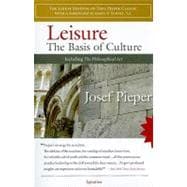About This Book
Leisure: The Basis of Culture by Josef Pieper is a seminal work in the field of philosophy, particularly in the context of modern society. This book, first published over 50 years ago, remains as relevant today as it was when it first appeared. Here’s a conversational overview of the book:
Who Uses It?
Primarily, this book is used by students and scholars of philosophy, particularly those interested in the intersection of culture, leisure, and spirituality. It is also a valuable resource for anyone looking to understand the importance of leisure in fostering a deeper connection with the world and with oneself. Educators and researchers in fields like cultural studies, theology, and philosophy often find this book essential for their studies.
History and Editions
The book has been in circulation since its initial publication, with the current edition including Pieper's work, *The Philosophical Act*. This edition has been updated to reflect the ongoing relevance of Pieper's ideas about leisure and its role in shaping culture. The book's enduring significance is a testament to its timeless insights into human nature and the importance of contemplation in a world dominated by activity.
Author and Other Works
Josef Pieper was a German philosopher known for his profound insights into the human condition. He wrote extensively on topics such as leisure, philosophy, and spirituality. *Leisure: The Basis of Culture* is one of his most influential works, alongside *The Philosophical Act*. Pieper's writing style is characterized by clarity and depth, making his works accessible to a broad audience while maintaining intellectual rigor.
Key Features
- Understanding Leisure: Pieper argues that leisure is not merely the absence of work but an attitude of the mind and a condition of the soul. He shows how ancient Greeks and medieval Europeans valued leisure as a means to contemplate the nature of God and the world.
- Cultural Significance: The book highlights how modern society's emphasis on constant activity has led to a vanishing of true leisure. Pieper warns that unless we regain the art of silence and insight, we risk destroying our culture and ourselves.
- Philosophical Act: This edition includes Pieper's work on *The Philosophical Act*, which explores the nature of philosophical inquiry and its relationship with everyday life.
Detailed Information
ISBNs and Formats
- Paperback: ISBN-13: 9781586172565
- Publisher: Ignatius Press
- Publication Date: 2009
- Dimensions: 8.00 x 5.30 inches
- Weight: 8 ounces
- Pages: 200
Other Editions and Formats
- Hardcover: Not available
- eTextbook: Not available
- Loose-leaf: Not available
- Rental Options: Not available
Publication Details
- Publisher: Ignatius Press
- Publication Date: December 2009
- Number of Pages: 200
- Language: English
- Item Weight: 8 ounces
- Dimensions: 8.00 x 5.30 inches
Related ISBNs
- 9781586172565 (Paperback)
- 1586172565 (Paperback)
This detailed information section provides a quick reference for all the available formats and sources for *Leisure: The Basis of Culture*, making it easier to find and access the book in the preferred format.
---
By providing this standardized display of information, eCampus.com can enhance the user experience for visitors by offering comprehensive details about the book, its author, and its relevance in educational settings.









